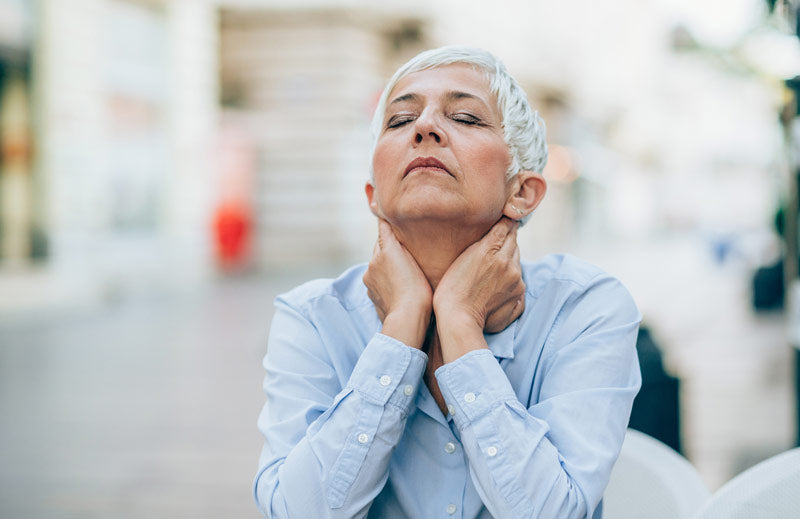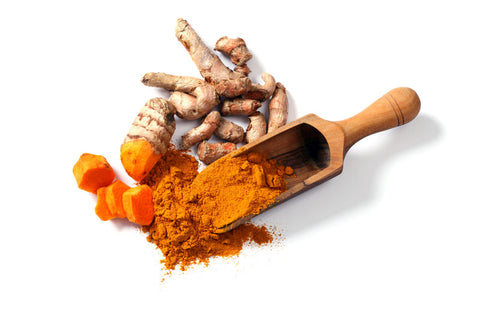3 Supplements for Menopause Joint Pain

Ah, menopause! History hasn’t exactly been kind to this stage in a woman’s life. Yet, there’s a fresh perspective in town: Menopause opens up a new chapter in your life, presenting new opportunities.
However, for many women, getting there is more of a turbulent roller coaster ride than anything else. Menopause officially happens when a woman goes 12 months without a period, marking the end of her fertile years. Prior to this time, hormonal fluctuations may cause hot flashes, headaches, irregular periods, and even joint pain.
In fact, menopause and joint pains are fairly common complaints. So, can menopause cause joint pain? Technically, yes. Hormonal changes, specifically declining estrogen, can lead to increased inflammation and joint aches, stiffness, and pain. But there are many ways to combat these issues including supplements for menopause joint pain which we examine in more detail below...
The Best Supplements for Menopause Joint Pain
While various conditions, like arthritis, cause joint stiffness, menopause can also be a major contributor. Research shows that estrogen helps reduce inflammation. Thus, with the loss of estrogen, joint pain and stiffness is more likely to occur due to a lack of protective effects.
So, can supplements help with menopausal joint pain? Which ones should you consider? Below, we offer up the best supplements for menopause joint pain.
1. Vitamin D
While during the summer months, vitamin D is easily obtained via good ol’ natural sunshine, in the winter and darker months in parts of the world, many people quickly become deficient. Surprisingly, about 52% of menopausal women are deficient in vitamin D.
Yet, vitamin D is well-known for its support when it comes to joint and bone health. Primarily, vitamin D helps the body absorb calcium, which contributes to new bone cells and repair. Thus, by supplementing with vitamin D, particularly in the winter months, menopausal women may experience less joint pain.
2. Estrogen

Hormonal replacement therapy (HRT) is frequently used to help menopausal women combat the symptoms that come with this time of life. In fact, estrogen receptors are found all over the body, including in the musculoskeletal system and joints. This means that estrogen can play an invaluable role in protecting the joints and reducing pain.
However, HRT or estrogen therapy often won’t be considered unless other menopausal symptoms are more severe and interfering with one’s daily life. It’s best to discuss your options with your doctor and determine what is right for you and your body. Your doctor may further recommend certain lifestyle changes to combat joint aches.
3. Collagen
Collagen is the most abundant protein found in the human body. It contributes to good skin, healthy hair, strong nails, and strong bones! When it comes to supplements for menopause joint pain, collagen is one of the best to consider taking on a daily basis.
Studies even show how collagen is very effective at treating osteoarthritis, the deterioration of the joints leading to pain. Collagen has further been shown to also help decrease joint pain in athletes. This is because collagen supplementation can boost collagen production in the body, improving joint and bone health, as well as accelerating healing and repair.
Other Menopausal Joint Pain Treatment Options
Outside of supplementation, there are also a variety of other menopausal joint pain treatment options. These include:
- Regular stretching of muscles and joints
- Applying ice or heat when needed
- Reducing stress with regular relaxation techniques
- Taking over-the-counter pain and anti-inflammatory medications
- Eating a healthy and balanced diet (including dairy, fatty fish, protein, and leafy greens)
- Exercising regularly (ex. Strength training can help support healthy joints and bones!)
- Losing weight in a healthy and sustainable way (if necessary)
At the end of the day, it’s important to discuss your options with your doctor. The method used to combat your specific menopausal joint pain may include a combination of supplements and lifestyle adjustments.

Additionally, curcumin is often referred to as a great supplement for menopause joint pain due to its anti-inflammatory effects. However, you can also obtain curcumin by adding turmeric to your food dishes or smoothies. When you combine curcumin with collagen, you get the best of both world where curcumin works to reduce inflammation and collagen works to repair any damage.
Again, finding what works best for you and your body is key as you navigate through menopause and enter a new era of your life!